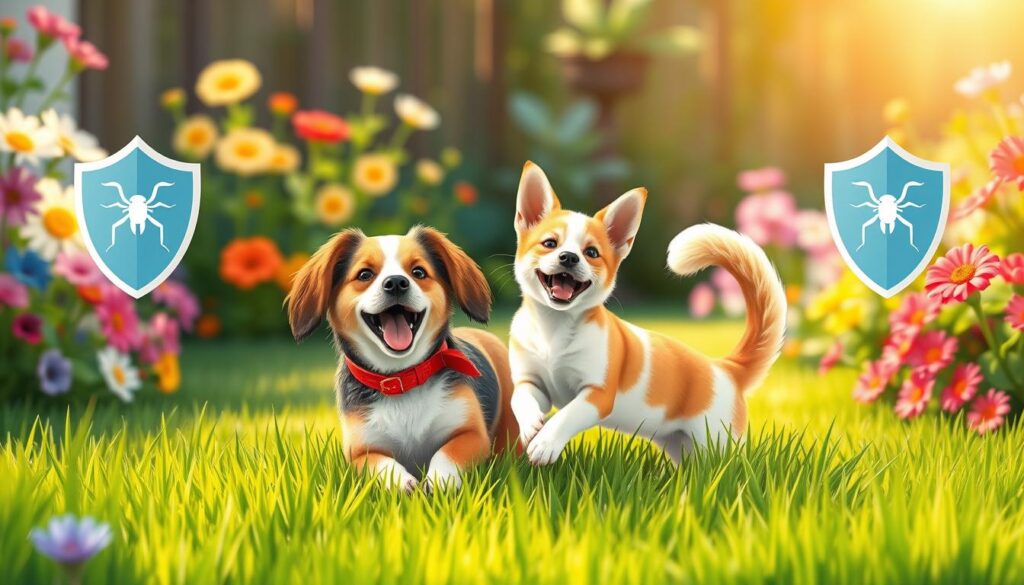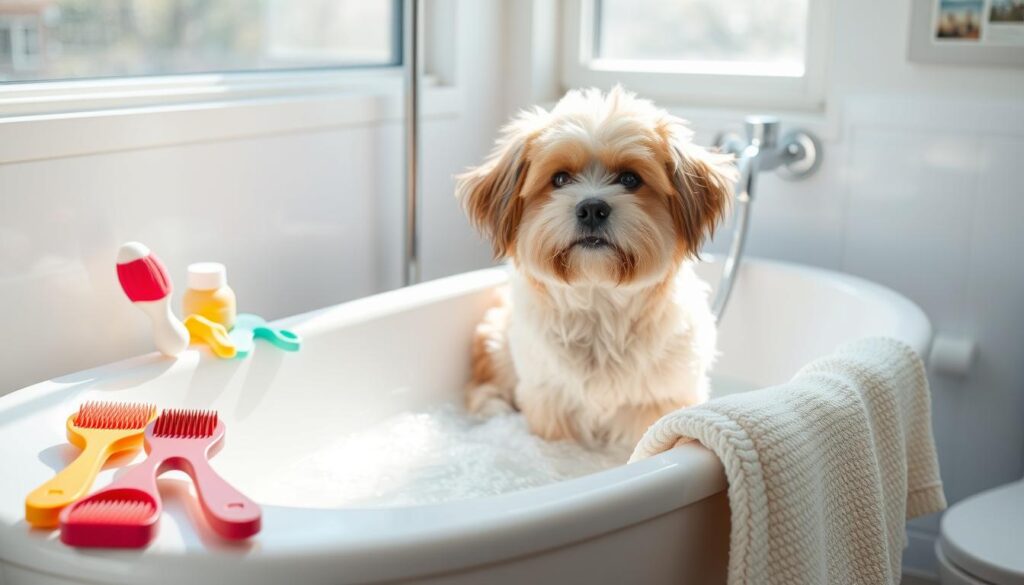Pet Wellness Tips Keeping your pet healthy is key to a long, happy life. By focusing on preventive care and regular vet visits, you can prevent expensive health problems. This includes everything from routine check-ups and shots to keeping them clean and free from parasites.
Good pet care does more than just keep them healthy. It also strengthens your bond with your pet. It saves you from the stress and cost of sudden illnesses. These tips are for all pet owners, whether you’re new or have been caring for pets for years.
Key Takeaways
- Proactive pet wellness care helps pets live longer, healthier lives
- Regular vet check-ups establish a health baseline and enable early disease detection
- Comprehensive wellness plans include preventive measures like vaccines, parasite control, and grooming
- Investing in pet wellness strengthens the human-animal bond and avoids costly medical issues
- Senior pets may require more frequent wellness check-ups for optimal health monitoring
Understanding the Foundations of Pet Health and Wellness
Keeping our pets healthy and happy is very important. Regular veterinary exams are key to this. They help spot any health issues early on.
Regular Veterinary Check-ups and Preventive Care
It’s vital to take your pet to the vet regularly. These visits keep vaccinations current and check overall health. Vets can also give advice on diet, exercise, and controlling pests.
Importance of Early Disease Detection
Early disease detection is crucial. Tests like blood panels and fecal exams help. Finding problems early means better treatment and outcomes.
Building a Strong Healthcare Routine
Creating a solid healthcare plan for pets is key. This includes regular vet visits, a good diet, and enough exercise. A proactive approach helps pets live longer, happier lives.
“Preventive care is often more effective and less costly than treating advanced health problems.”
Pet Wellness Tips for Optimal Nutrition and Weight Management

Proper nutrition and the right weight are key for your pet’s health and long life. Choosing the right pet diet is vital. Dogs and cats need a mix of proteins, fats, carbs, vitamins, and minerals for growth and energy.
See a vet to find the best food for your pet. Don’t give them table scraps or toxic foods like chocolate, grapes, and onions. Good pet food keeps them healthy, with a shiny coat and strong teeth.
Keeping a healthy weight is also crucial. Obesity is a big problem, with 60% of cats and 54% of dogs at risk. Being overweight can shorten a dog’s life by up to 2 and ½ years.
- Cats need more protein in their diet.
- Lean meats, fruits, and veggies should only be 10% of their diet, unless a vet says it’s okay.
- Prescription diets for weight loss use fiber, water, or air to make pets feel full without too many calories.
- Regular weigh-ins help track your pet’s weight and check if weight loss plans are working.
Knowing your pet’s nutritional needs and keeping them at the right weight is key for their health. Regular vet visits and a diet tailored to your pet’s needs are vital for their wellness.
The Role of Exercise and Mental Stimulation

Regular exercise is key for our pets’ health. It’s important to mix daily physical and mental activities into their routine. This is true for all pets, whether they’re energetic dogs or curious cats.
Daily Physical Activity Requirements
The amount of exercise pets need varies. It depends on their breed, age, and health. Dogs usually need 30 minutes to two hours of activity each day. This can be walks, runs, or playing fetch.
Cats need two 10-15 minute play sessions a day. This helps them act like they’re hunting. Small animals like rabbits or guinea pigs can run on exercise wheels or play in safe areas.
Regular exercise keeps pets’ muscles and joints flexible. It also keeps them agile.
Interactive Play and Training Sessions
Mental stimulation is just as important as physical exercise. It keeps pets from getting bored and stressed. It also improves their thinking skills.
Puzzle toys, scent games, and obedience classes are great. They challenge pets and strengthen their bond with us.
Environmental Enrichment Strategies
Creating a stimulating environment is vital for pets’ mental health. Give them vertical space, scratching posts, and change toys often. This encourages natural behaviors like climbing and exploring.
Combining physical activity with mental stimulation is essential. It ensures your pet’s happiness and well-being. By meeting their needs, you help them live a fulfilling life.
Preventive Healthcare and Parasite Control

Keeping your pet healthy is more than just vet visits. It’s important to prevent parasites like fleas, ticks, and worms. These pests can lead to serious health problems, including heartworm disease, Lyme disease, and demodectic mange.
Make sure to give your pet the right preventative medications on time. Regular grooming and checks after they go outside can spot fleas and ticks. If your pet scratches a lot or has ear problems, see the vet fast. Quick action can stop your pet’s pain, prevent disease, and keep your home safe.
| Core Vaccinations for Dogs | Core Vaccinations for Cats |
|---|---|
|
|
Being proactive with parasite prevention, flea control, and tick prevention keeps your pet safe and healthy. This helps them live a long, happy life.
“Preventive exams or vaccines cost less than emergency visits, surgeries, or complications from untreated diseases, resulting in long-term cost savings for pet owners.”
Grooming and Dental Hygiene Essentials

Keeping your pet’s grooming and dental health in check is key to their happiness. Regular grooming keeps their coat shiny, nails short, and spots any skin problems early. Dogs and cats often get periodontal disease by age 3, which can cause big health issues if not treated.
Good oral hygiene is vital. This includes regular vet cleanings and brushing their teeth at home. It’s crucial for your pet’s dental health.
Professional vs. Home Grooming Practices
While you can groom your pet at home, pros offer special services for tough grooming needs. Long-haired pets need grooming every 4-6 weeks. Short-haired ones can go 8-12 weeks between groomings.
Professional groomers are great for pets with hard-to-trim nails or special grooming needs.
Dental Care and Oral Health Maintenance
Getting your pet to brush their teeth daily can be tough. But brushing a few times a week is better than not at all. Start by gradually getting them used to toothbrushes and pet toothpaste.
Use vet-approved dental chews, treats, and water additives to keep their teeth clean.
Regular Nail Care and Skin Health
Keeping your pet’s nails trimmed is crucial for their comfort and movement. Grooming is also a chance to check for skin issues that need vet care. Brushing and massaging during grooming boosts blood flow, keeping their skin and coat healthy.
Both professional and at-home pet grooming are important for your pet’s health and looks. Focus on dental care, nail trimming, and skin health to keep your pet happy and healthy.
Also Read: How To Treat Skin Infections In Pets Naturally?
Conclusion
Good pet care means giving them the right food, exercise, and mental challenges. It also means staying ahead of health problems. This way, pets can live long, happy lives. Vets are key in helping owners meet their pets’ special needs.
Being a pet parent is a big job, but it’s also incredibly rewarding. A happy pet brings joy and love into our lives. By following key pet care tips, owners can build a strong bond with their pets.
Feeding pets right, keeping them active, and preventing health issues are key. Adding mental games and grooming helps too. With a full-care approach, pets can live their best lives.
FAQs
Q: What are some essential pet wellness tips every owner should know?
A: Essential pet wellness tips include regular check-ups with your veterinarian, maintaining a high-quality diet for your pet, ensuring proper hydration, providing routine exercise, and scheduling professional dental cleanings to help your pet stay happy and healthy.
Q: How can I help my pet during National Pet Wellness Month?
A: During National Pet Wellness Month, you can focus on comprehensive pet wellness by scheduling an annual wellness exam with your veterinarian, discussing vaccination needs, and reviewing your furry friend’s diet and exercise routine to help you keep your pet’s health on track.
Q: Why are vaccinations important for my pet’s wellness?
A: Vaccinations are crucial for protecting your pet from many preventable diseases. Keeping your dog or cat up-to-date on vaccinations is a key part of their overall wellness plan and helps ensure a healthy life for your furry friend.
Q: What should I consider when feeding my pet?
A: When feeding your pet, consider their age, weight, and activity level to determine the best diet for your pet. Providing a balanced and high-quality diet based on your pet’s unique needs can promote their health and happiness.
Q: How often should I take my pet for veterinary care?
A: It is recommended to take your pet for veterinary care at least once a year for routine wellness exams. However, older pets or those with health issues may require more frequent visits to monitor their overall wellness.
Q: What are the benefits of spaying or neutering my pet?
A: Spaying or neutering your pet can lead to several health benefits, including a reduced risk of certain cancers and behavioral issues. This procedure also helps control the pet population, contributing to the overall wellness of the community.
Q: How can I maintain my pet’s dental health?
A: Maintaining your pet’s dental health involves regular brushing of your pet’s teeth, providing dental treats, and scheduling professional dental cleanings with your veterinarian. These practices can prevent dental diseases and support your pet’s overall wellness.
Q: What are some tips for boosting my pet’s physical activity?
A: To boost your pet’s physical activity, engage in daily walks, play interactive games, and offer toys that encourage movement. Regular exercise is essential for your furry friend’s health and helps maintain a healthy weight.
Q: How often should I schedule dental cleanings for my pet?
A: Ideally, you should schedule professional dental cleanings for your pet at least once a year. However, the frequency may vary based on your pet’s dental health and your veterinarian’s recommendations.
Q: What are the signs that my pet needs a wellness exam?
A: Signs that your pet may need a wellness exam include changes in appetite, lethargy, excessive grooming, bad breath, or any unusual behavior. If you notice any of these signs, it’s important to consult your veterinarian promptly for a thorough evaluation.
Source Links
- https://bettervet.com/resources/pet-health-care
- https://petlandstl.com/2024/10/21/the-ultimate-guide-to-pet-wellness-ensuring-a-happy-and-healthy-life-for-your-furry-friends/
- https://harboursidevet.com/pet-wellness-tips-pet-health/
- https://www.myarlingtonvet.com/blog/pet-wellness-care/
- https://www.theuniversityanimalclinic.com/services/blog/weight-management-and-nutrition-pets-balanced-approach
- https://bettervet.com/resources/pet-nutrition/healthy-weight-in-pets
- https://www.oradell.com/services/blog/pet-wellness-month-8-ways-ensure-your-pet-living-their-best-life
- https://www.ballantynevet.com/blog/a-comprehensive-guide-to-pet-health-and-wellness-tips
- https://www.petcgfk.com/mental-physical-stimulation-is-your-dog-getting-what-they-need/
- https://www.getweave.com/pet-preventive-care/
- https://vcahospitals.com/know-your-pet/preventive-health-care-guidelines-for-dogs
- https://birdiesdoghouse.com/dog-care-101-checklist/
- https://purrfectgrooming.pet/blog/b/the-role-of-pet-grooming-in-pet-health-and-wellness/
- https://www.bowmanvet.com/blog/how-to-brush-your-pets-teeth-a-step-by-step-guide/
- https://petlandkennesaw.com/the-ultimate-guide-to-pet-wellness-ensuring-a-happy-and-healthy-life-for-your-furry-friends/
- https://thevetfocus.com/blogs/blog/unlocking-pet-wellness-top-10-expert-tips-for-optimal-health
- https://docansede.com/pet-wellness-101-comprehensive-care-for-your-animal-companion/




